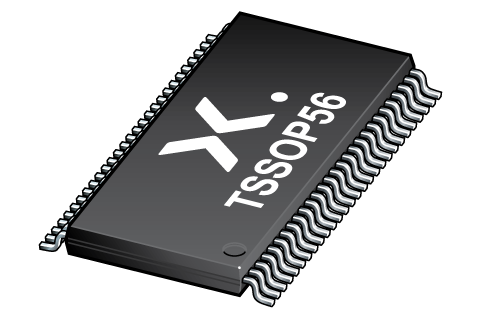Orderable parts
| Type number | Orderable part number | Ordering code (12NC) | Package | Buy from distributors |
|---|---|---|---|---|
| 74ALVT16821DGG | 74ALVT16821DGG,118 | 935210010118 | SOT364-1 | Order product |
Discover Nexperia’s extensive portfolio of diodes, bipolar transistors, ESD protection devices, MOSFETs, GaN FETs, IGBTs, and analog & logic ICs. Our components power virtually every electronic design worldwide - from automotive and industrial to mobile and consumer applications.
Our products find applications across various industries, from automotive and industrial to power, computing, consumer, mobile, and wearables. With a commitment to innovation and sustainability, our components set benchmarks in efficiency, empowering our global customer base to develop energy-efficient and cutting-edge solutions.
Try out our devices and their performance with our comprehensive range of evaluation boards. Gain a deeper understanding of how our products can benefit your application, whether it's optimizing for efficiency, robustness, or reliability. You can find Application focus, Package focus, and different Nexperia Product focus boards here.

Register once, drag and drop ECAD models into your CAD tool and speed up your design.
Click here for more information20-bit bus interface D-type flip-flop; positive-edge trigger; 3-state
The 74ALVT16821 is a 20-bit positive-edge triggered D-type flip-flop with 3-state outputs.
The device can be used as two 10-bit flip-flops or one 20-bit flip-flop. The device features two clocks (1CP and 2CP) and two output enables (1OE and 2OE), each controlling 10-bits. The flip-flops will store the state of their individual D-inputs that meet the set-up and hold time requirements on the LOW-to-HIGH clock (nCP) transition. A HIGH on nOE causes the outputs to assume a high-impedance OFF-state. Operation of the nOE input does not affect the state of the flip-flops. Bus hold data inputs eliminate the need for external pull-up resistors to define unused inputs
Wide supply voltage range from 2.3 V to 3.6 V
Overvoltage tolerant inputs to 5.5 V
20-bit positive-edge triggered register
BiCMOS high speed and output drive
Direct interface with TTL levels
Bus hold on data inputs
No bus current loading when output is tied to 5 V bus
Power-up 3-state
IOFF circuitry provides partial Power-down mode operation
Latch-up performance exceeds 500 mA per JESD 78 Class II Level B
HBM: ANSI/ESDA/JEDEC JS-001 class 2 exceeds 2000 V
CDM: ANSI/ESDA/JEDEC JS-002 class C3 exceeds 1000 V
Specified from -40 °C to 85 °C
| Type number | VCC (V) | Logic switching levels | Output drive capability (mA) | tpd (ns) | fmax (MHz) | Power dissipation considerations | Tamb (°C) | Rth(j-a) (K/W) | Ψth(j-top) (K/W) | Package name |
|---|---|---|---|---|---|---|---|---|---|---|
| 74ALVT16821DGG | 2.3 - 3.6 | TTL | -32/+64 | 1.8 | 150 | medium | -40~85 | 93 | 21 | TSSOP56 |
| Type number | Orderable part number, (Ordering code (12NC)) | Status | Marking | Package | Package information | Reflow-/Wave soldering | Packing |
|---|---|---|---|---|---|---|---|
| 74ALVT16821DGG | 74ALVT16821DGG,118 (935210010118) |
Active | ALVT16821 |

TSSOP56 (SOT364-1) |
SOT364-1 |
SSOP-TSSOP-VSO-WAVE
|
SOT364-1_118 |
| Type number | Orderable part number | Chemical content | RoHS | RHF-indicator |
|---|---|---|---|---|
| 74ALVT16821DGG | 74ALVT16821DGG,118 | 74ALVT16821DGG |
|
|
| File name | Title | Type | Date |
|---|---|---|---|
| 74ALVT16821 | 20-bit bus interface D-type flip-flop; positive-edge trigger; 3-state | Data sheet | 2024-06-25 |
| AN90063 | Questions about package outline drawings | Application note | 2025-06-13 |
| SOT364-1 | 3D model for products with SOT364-1 package | Design support | 2020-01-22 |
| alvt16821 | alvt16821 IBIS model | IBIS model | 2013-04-08 |
| Nexperia_package_poster | Nexperia package poster | Leaflet | 2020-05-15 |
| SOT364-1 | plastic, thin shrink small outline package; 56 leads; 0.5 mm pitch; 14 mm x 6.1 mm x 1.2 mm body | Package information | 2022-06-23 |
| SOT364-1_118 | TSSOP56; Reel pack for SMD, 13"; Q1/T1 product orientation | Packing information | 2020-04-21 |
| 74ALVT16821DGG_Nexperia_Product_Reliability | 74ALVT16821DGG Nexperia Product Reliability | Quality document | 2025-03-20 |
| alvt16 | alvt16 Spice model | SPICE model | 2013-05-07 |
| SSOP-TSSOP-VSO-WAVE | Footprint for wave soldering | Wave soldering | 2009-10-08 |
If you are in need of design/technical support, let us know and fill in the answer form we'll get back to you shortly.
The Nexperia Longevity Program is aimed to provide our customers information from time to time about the expected time that our products can be ordered. The NLP is reviewed and updated regularly by our Executive Management Team. View our longevity program here.
| Type number | Orderable part number | Ordering code (12NC) | Status | Packing | Packing Quantity | Buy online |
|---|---|---|---|---|---|---|
| 74ALVT16821DGG | 74ALVT16821DGG,118 | 935210010118 | Active | SOT364-1_118 | 2,000 |
|
As a Nexperia customer you can order samples via our sales organization.
If you do not have a direct account with Nexperia our network of global and regional distributors is available and equipped to support you with Nexperia samples. Check out the list of official distributors.
The interactive datasheets are based on the Nexperia MOSFET precision electrothermal models. With our interactive datasheets you can simply specify your own conditions interactively. Start by changing the values of the conditions. You can do this by using the sliders in the condition fields. By dragging the sliders you will see how the MOSFET will perform at the new conditions set.